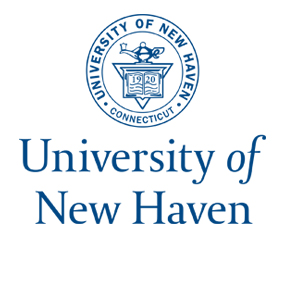
University News
University of New Haven Acquires Railroad Salvage Building and Land Adjacent to Main Campus
The 130,000 square-foot-building and 12-acre lot will be reimagined to create a pioneering Research and Development Center.
The Charger Blog
From her work with the NYPD to her leadership as an educator, Barbara Lawrence, J.D., MPA has been at the leading edge of promoting diversity, equity, and inclusion throughout her career. She’s excited to be playing a critical role in continuing to ensure that the University community makes all Chargers feel welcomed and a sense of belonging.
February 8, 2024
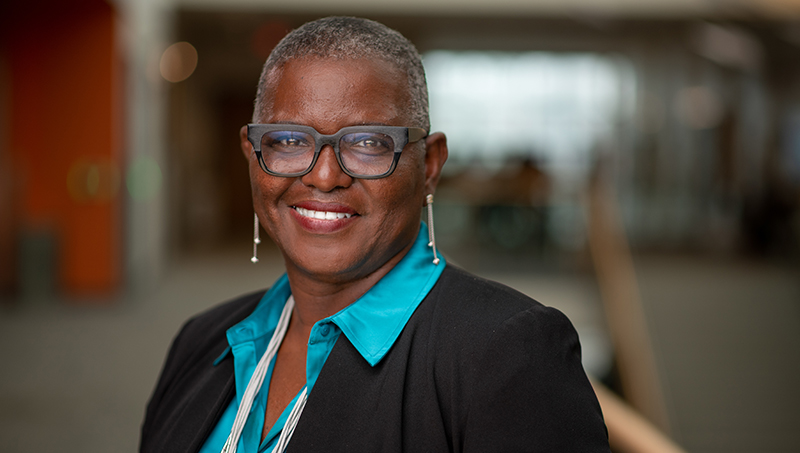
When Barbara Lawrence, J.D., MPA was little, she saw Barbara Jordan, an attorney, educator, activist, and politician, on TV. Lawrence was inspired. She’d found a role model. This was truly someone she wanted to be like.
The child of parents from North Carolina, Lawrence grew up in New York City and dreamed of becoming a civil rights attorney. She comes from a family of educators, and her mother was an activist and a minister. Their work and their dedication also inspired Lawrence, and she wanted to make her own impact.
She believed that joining the New York Police Department would fast track her legal career. After she was recruited, she became a member of the transit police, eventually going on to do undercover work and helping to start a domestic violence unit, which is now nationally recognized. A leader at the department, much of her work with the police laid the foundation for her later work as an advocate and an educator. She served as a law instructor and trainer, leading sensitivity and anti-racism training.
“Today, that’s called DEI (diversity, equity, and inclusion),” she explains. “I’ve been doing this work throughout my career."
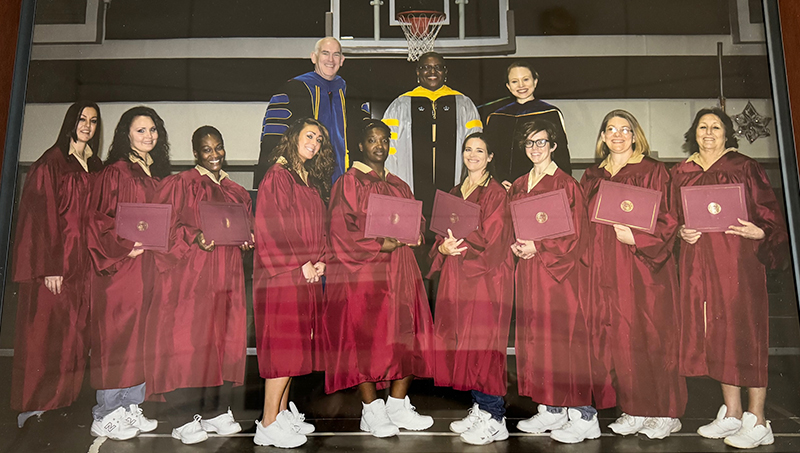
After retiring early from the force, Lawrence went to law school and was asked to work on a grand jury investigation unit, an opportunity she describes as “like an internship.” She also worked for the public defender’s office, further inspiring her to make a meaningful impact on clients’ lives, and for the prosecutor’s office.
There was one case, in particular, that was especially impactful for Lawrence when she was practicing law in Indiana. She was trying a case of a 19-year-old Black man who had been pulled over while in the car with friends. A gun had been found in the car, and while the man in question wasn’t the driver, he had a previous drug conviction. Lawrence was to try his case and convince the jury to send him to prison for 20-25 years because his crimes fell under the serious violent felon statute. She knew what she was supposed to do, but it wasn’t what she believed was right.
“It broke my heart,” she recalls. “I did my best work, and I was successful. But it broke me down. I didn’t believe that we as public servants should use those statutes to do more harm than good.”
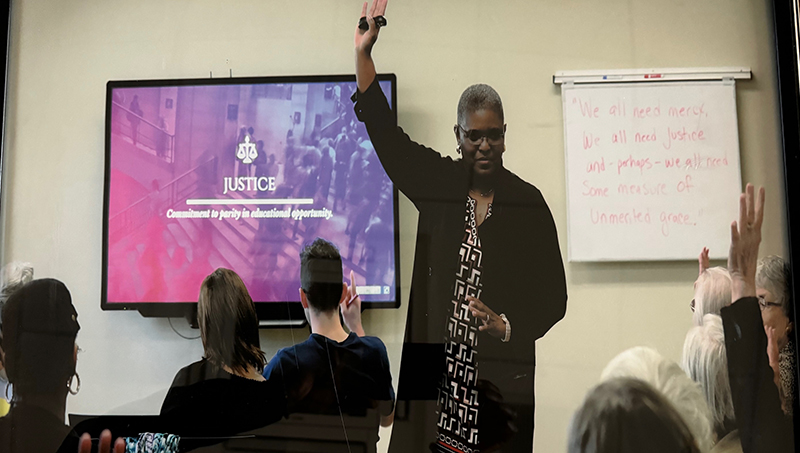
Lawrence left the prosecutor’s office and decided she wanted to focus on addressing policy. She went on to earn her J.D. from the Indiana University School of Law and her Master of Public Administration from Indiana University-Purdue University Indianapolis. Deciding to continue her education enabled her to explore meaningful research and teaching opportunities, setting the course for the next stage of her career.
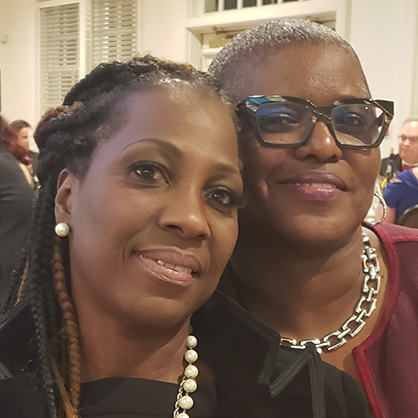
Becoming a tenured professor at Guilford College in North Carolina enabled her to focus on policy, justice, and DEI. She served in a variety of roles, including as chair of the Department of Justice and Policy Studies and as vice president for diversity, equity, and inclusion.
“I always had a desire to serve,” said Lawrence, who also holds a bachelor’s degree from John Jay College of Criminal Justice. “My mom exposed me early on to service and encouraged me to advocate for someone or something. I wanted to do something to address civil rights and inequality in communities.”
She did just that while at Guilford. While as a law enforcement officer, she’d been encouraged to pick up low-level drug dealers rather than distributors. She’d been “part of the war on drugs” while going undercover and making arrests. Now, as an educator, she took the opportunity to help incarcerated individuals continue their education. She served as the founding director of the Wiser Justice Program, Guilford's Higher Education in Prison Initiative. Her advocacy even ensured that students had the opportunity to take the Leadership in Energy and Environmental Design (LEED) exam – despite a three-year-ban on those who were incarcerated. That ban has since been lifted.
After holding a variety of leadership positions at Guilford, Lawrence went on to lead DEI efforts at Rider University. She launched the school’s Division of Justice, Diversity, Equity, and Inclusion; chaired the President’s Council on Inclusion; and served as the institution's inaugural vice president for diversity, equity, and inclusion and chief diversity officer. She says this work is critical, and it’s something she strongly believes in.
“This needs to be intentional,” she said. “The world and students are changing. We need to be prepared.”
As the University of New Haven’s vice president for institutional equity and diversity, chief diversity officer, and Title IX coordinator, Lawrence is ensuring that the University continues to support Chargers in every possible way. She’s looking forward to continuing to collaborate with various departments and committees, from the Center for Teaching Excellence and the Myatt Center for Diversity and Inclusion to the Undergraduate Student Government Association. She also believes in the importance of DEI-related coursework for students and faculty.
Lawrence hopes to create a diversity, equity, inclusion, access, and belonging (DEIAB) division at the University. The infrastructure, she says, is already in place. There are, for example, DEI committees that are part of student groups and each of the academic colleges and schools. Lawrence is co-chair of the Inclusion, Diversity, Equity, and Access (IDEA) Council, which was founded more than a decade ago. She’s excited to focus on training, recruiting, retention, and mentoring programs.
“I want to get everyone involved,” said Lawrence, who joined the University last summer. “With that infrastructure, we would touch every unit and everyone – students, faculty, and staff. It helps people want to engage, and it’s how we can create space.”
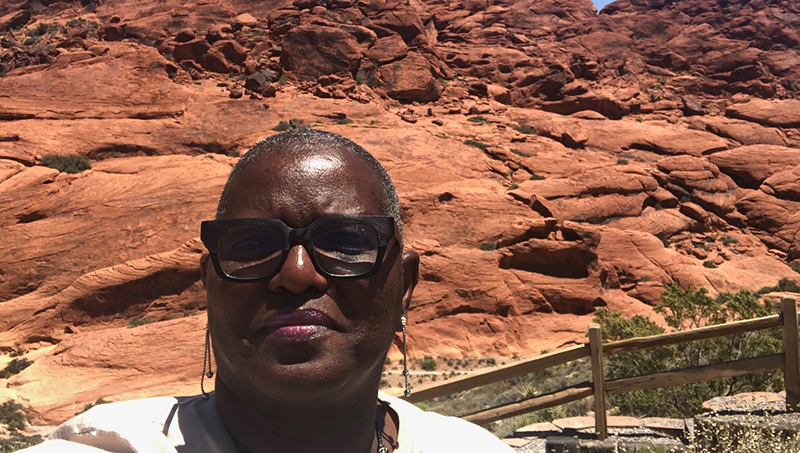
Lawrence moved to Connecticut last summer, and she’s been enjoying getting to know her new home state. She appreciates the diversity, the restaurants, and the entertainment. A fan of comedy clubs, she also loves music, especially R&B, gospel, hip-hop, and jazz.
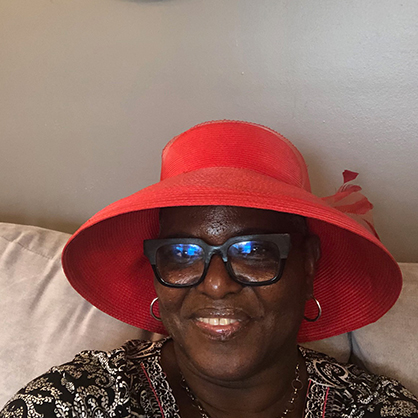
As she continues to embrace all that the local and University communities have to offer, she imagines even greater connections between the two. She hopes to foster community service and engagement among Chargers, and she draws on her own experience when she first joined the University community.
“The welcome I received helped me integrate into the University and local communities,” she said. “Dr. Danielle Cooper gave me a warm welcome. That’s the type of environment I want to continue to create here. She reached out to me, and that helped me be my best self. That’s what I want for our students and colleagues.”
Lawrence envisions a DEIAB network that would ensure that all Chargers feel that sense of belonging. She also is dedicated to fostering an open dialogue and to making sure all Chargers feel comfortable showing up and being their authentic selves. Ultimately, she says, she’s devoted to bringing kindness, caring, and positivity to those around her and to letting others know how much they matter.
“I love love, and I show love,” she explains. “I say hello, and I bring love into my space. That’s part of who I am. That can make a difference in someone’s life. I also love our students. I enjoy meeting with them. I want to spread love.”

University News
The 130,000 square-foot-building and 12-acre lot will be reimagined to create a pioneering Research and Development Center.
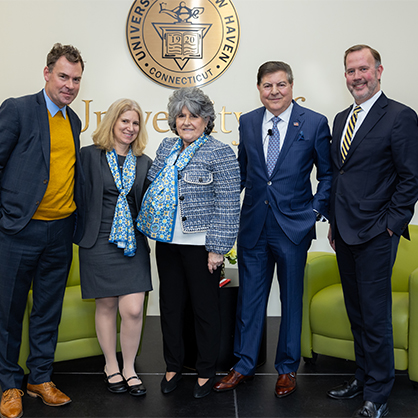
The Charger Blog
In an engaging fireside chat with the University of New Haven President Jens Frederiksen, Ph.D., Frank Martire ’77 MBA, an esteemed business leader, philanthropist, and advocate for higher education, shared insights on leadership, navigating challenges, and staying true to your values in a complex world.
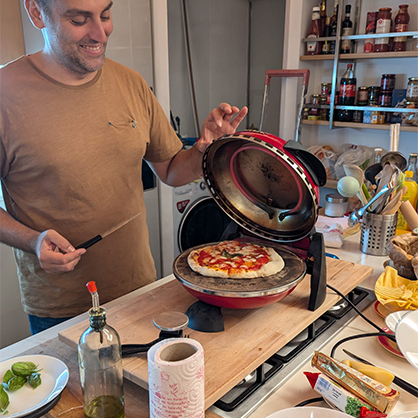
The Charger Blog
Students share their transformative moments from studying at the University’s Prato campus during the Fall 2024 semester.